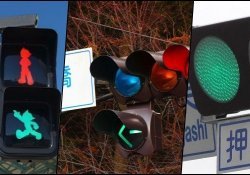Arriving how to say "big" and "small" in Japanese is essential for daily communication. These adjectives are widely used in various contexts, from the description of sizes and dimensions to the expression of emotions and feelings. In this article, we will explore how to say "big" and "small" in Japanese, as well as some important nuances of these words in the language.
We also recommend reading:
- Why do manga and anime characters have big eyes?
- What does Kodama mean in Japanese?
- Unraveling the Mysterious Meaning of Kira in Japanese
Índice de Conteúdo
[大] Big in Japanese
Kanji "大" (Dai/Ooki) represents the idea of size, volume and importance. Its original form comes from the old Chinese character "大", which represented a man with open arms, symbolizing the idea of greatness and amplitude.
It is common to use Kanji with its "Dai" pronouncement accompanied by another word to say "bigger, big or much." For example, "Daisuki" [大好き] means I like it very much, I love it so much.
How to say Big in Japanese?
The Japanese word for "big" is "大きい" (ookii). The first character "大" means "large" or "grandeur", and the second character "きい" is a suffix that indicates the adjectival form of the term.
This word originates from the ancient Japanese language and has been passed down through time as a common term to express the size or magnitude of something.
The word "大きい" is used to describe objects, animals and people of large size or greatness in general.
Words related to big in Japanese
Here are some words that can be used as synonymous with "big" in Japanese:
- 大規模 (daikibo) - large scale
- 巨大 (Kyodai) - Huge
- 大量 (Tairyō) - Large quantity
- 大統領 (Daitōryō) - President (literally "great leader")
- 雄大 (Yūdai) - Majestic
- 豪華 (gouka) - luxurious
- 壮大 (Sōdai) - Great
- 大胆 (Daitan) - audacious
- 重要 (juuyou) - important
- 極大 (kyokudai) - Extremely large.

[小] Small in Japanese
Kanji "小" (Shou/Chiisai) represents the idea of small, lower size or inferiority compared to something larger. Its original form is derived from the old Chinese character "小", which represented a small child.
How to say small in Japanese?
The word "小さい" (Chiisai) is derived from kanji "小" (shou), which means small, and "さい" (leaves), which is a suffix that indicates the property or condition of something. This is the prince of saying that something is small.
"小さい" is a word used to describe objects, animals and people of small size or smallness in general. The origin of this word is uncertain, but may have originated from an old Japanese word meaning "thin" or "small".
Words related to small in Japanese
- 小さい (Chiisai) - Small
- 小型 (shōgata) - Small size
- 小規模 (shōkibo) - Small scale
- 小包 (Kobukuro) - Small package
- 小指 (Koyubi) - Mindine finger (literally "small finger")
- 小鳥 (kotori) - bird (literally "small bird")
- 細かい (komakai) - small and detailed
- 軽微 (keibi) - light, small in terms of gravity
- 切実 (setsujitsu) - intense but small on scale
- 小休止 (shōkyūshi) - Small break, brief rest.

Other ways to say Small or Big in Japanese
大きな (Ookina) - This is an alternative way to say "big", which further emphasizes the size or importance of something. For example, "大きな手紙" (Ookina Tegami) means "a large letter".
小さめ (Chiisame) - This is a way of saying "small", which further emphasizes the smallness of something. For example, "小さめのカバン" (Chisame no Kaban) means "a small bag".
小型 (Shougata) - This word is used to describe smaller or reduced objects or devices. For example, "小型カメラ" (shou-gata kamera) means "small camera".
ミニ (mini) - This is a word borrowed from English, which is used to describe something in miniature or small size. For example, "ミニチュア" (miniachua) means "miniature".
マイクロ (maikuro) - This is another word borrowed from English, which is used to describe something extremely small. For example, "マイクロチップ" (maikurochippu) means "microchip".
The article is still halfway through, but we recommend also reading:
Medium and other sizes in Japanese
In addition to the words "big" and "small", there are several other terms in Japanese that can be used to describe sizes and dimensions of objects, animals, people and other things. Here are some examples:
- 長い (nagai) - long
- 短い (mijikai) - short
- 広い (Hiroi) - Broad
- 狭い (SEMAI) - Strait
- 太い (Futoi) - Grosso
- 細い (Hosoi) - Fine
- 深い (Fukai) - Deep
- 浅い (Asai) - shallow
- 大きめ (ookime) - Large size (augmentative form)
- 小さめ (Chiisame) - Small size (diminutive shape)
- 大型 (Oogata) - Large
- 小型 (Shougata) - Small size
- 中型 (Chugate) - Medium Size
- ララジ (Raaji) - Grande, borrowed from the English "Large"
- スモルル (Sumoru) - Small, borrowed from the English "Small"
- ミディアム (Midiami) - Medium, borrowed from the English "Medium"
- ジャンボ (janbo) - giant, borrowed from the English "jumbo"
- コンパクト (Konpakuto) - Compact, borrowed from the English "Compact"
How to tell if a person is short or tall?
To describe whether a person is tall or short in Japanese, you can use the following words:
- 高い (Takai) - High
- 低い (Hikui) - Baixa
These words can be used to describe a person's physical height. For example, "彼女はとてもがが" (kanojo wa totemo if ga takai) means "she is too tall", while "彼背が低い" (kare wa hikui) means "he is low".







